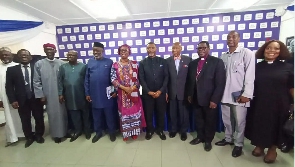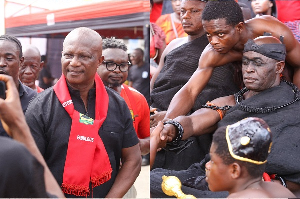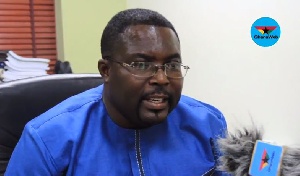Some religious leaders have supported calls for the review of the 1992 Constitution to make it robust and inclusive and to conform to modern governance dynamics.
Taking their turn at the Institute of Economic Affairs' (IEA) Constitutional Review Seminar in Accra on Wednesday, the leaders said 30 years after the implementation of the current constitution, there had been identifiable lapses in the areas of presidential powers, separation of powers, social exclusion, gender equity, institutional weaknesses, and decentralisation, among others.
The religious leaders said the review of the constitution must, however, lead to an enhancement of religious tolerance, deepening democracy, and improvements in the lives of the people.
The speakers at the event were: Dr Lawrence Tetteh, President, Worldwide Miracle Outreach; Sheikh AremeyawShaibu, Spokesperson, National Chief Imam; the Most Reverend Dr Paul Kwabena Boafo, Presiding Bishop, Methodist Church of Ghana; Maulvi Mohammed Bin Salih, Head, Ahmadiyya Muslim Mission, and Apostle Samuel Amponsah Frimpong, Chairman, Christ Apostolic Church.
Dr. Tetteh called for the review of the four-year term of presidents to six years to offer governments adequate time to plan and implement them.
He said the current arrangement did not offer presidents adequate time to put things in order and implement policies for the various sectors of the economy in the long term.
Dr. Tetteh, however, expressed concern over what he described as the excessive powers enjoyed by the president, saying the situation limited checks and balances.
"The Constitution should be reviewed to reduce the president's authority while enhancing the functions of Parliament," he said.
Dr. Tetteh also called for gender inclusivity in the review of the 1992 Constitution and recommended that women be allotted full representation in governance.
Sheikh Shaibu said he was not in support of the total overhaul of the 1992 Constitution, but the inadequacies identified after three decades of implementation should be addressed.
He called for an entrenched provision in the constitution to make the long-term development agenda of the National Development Planning Commission (NDPC) binding on successive presidents.
"We need a new breed of politicians with a new mindset, who see politics as a means of serving the people and not to amass wealth," Sheikh Shaibu said.
The Most Rev. Boafo called for a review of the indemnity clause, which insulated presidents from any prosecution within three years after leaving office.
He said the period provided by the constitution was not enough for the gathering of evidence to support any form of prosecution of a president in the event of mismanagement.
Most Rev. Boafo said Affirmative Action should be given constitutional recognition to promote inclusivity at all levels.
"The NDPC should be entrusted with the development agenda of the country, and it should be such that no party can abandon the plan," he said.
Maulvi Bin Salih said the 1992 Constitution had thus far promoted religious tolerance and that any review of the constitution must encourage religious harmony and peaceful coexistence.
"Apart from politics, which is a big problem, we should pay attention to religion. Let's restrain some of our people who make fearing speeches and attack people regardless of the consequences," he said.
Maulvi Bin Salih added: "We should remain a secular state, and the Constitution should allow anyone to profess their faith in harmony," he said.
Apostle Frimpong said the 1992 Constitution had been "the most enduring" one, adding that a review of some portions of the constitution would deepen the culture of democracy and create an inclusive atmosphere.
He said the review should also embrace measures that would lead to the transformation of the economy and bring relief to the people.
"The review of the Constitution must take care of things that will make us economically viable and eliminate poverty," Apostle Frimpong said.
Politics of Thursday, 6 April 2023
Source: GNA

















